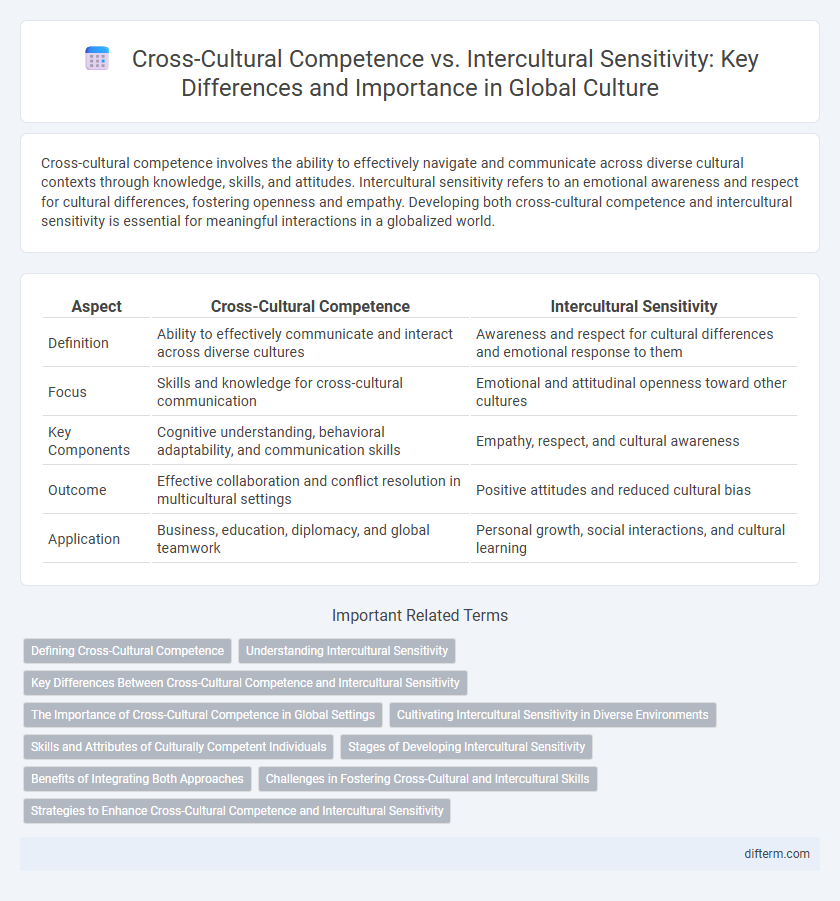Cross-cultural competence involves the ability to effectively navigate and communicate across diverse cultural contexts through knowledge, skills, and attitudes. Intercultural sensitivity refers to an emotional awareness and respect for cultural differences, fostering openness and empathy. Developing both cross-cultural competence and intercultural sensitivity is essential for meaningful interactions in a globalized world.
Table of Comparison
| Aspect | Cross-Cultural Competence | Intercultural Sensitivity |
|---|---|---|
| Definition | Ability to effectively communicate and interact across diverse cultures | Awareness and respect for cultural differences and emotional response to them |
| Focus | Skills and knowledge for cross-cultural communication | Emotional and attitudinal openness toward other cultures |
| Key Components | Cognitive understanding, behavioral adaptability, and communication skills | Empathy, respect, and cultural awareness |
| Outcome | Effective collaboration and conflict resolution in multicultural settings | Positive attitudes and reduced cultural bias |
| Application | Business, education, diplomacy, and global teamwork | Personal growth, social interactions, and cultural learning |
Defining Cross-Cultural Competence
Cross-cultural competence refers to the ability to effectively communicate, interact, and work with individuals from diverse cultural backgrounds by understanding cultural norms, values, and behaviors. It involves developing skills such as cultural awareness, adaptability, and empathy to navigate complex social and professional settings. Mastery of cross-cultural competence enhances collaboration, reduces misunderstandings, and promotes inclusive environments across globalized contexts.
Understanding Intercultural Sensitivity
Intercultural sensitivity is the ability to recognize, respect, and appropriately respond to cultural differences, fostering effective communication and reducing misunderstandings. Unlike cross-cultural competence, which emphasizes skills and knowledge for interacting with diverse cultures, intercultural sensitivity focuses on emotional and perceptual awareness of cultural diversity. Developing this sensitivity enhances empathy and adaptability in multicultural environments, crucial for global collaboration and conflict resolution.
Key Differences Between Cross-Cultural Competence and Intercultural Sensitivity
Cross-cultural competence involves the ability to effectively interact and communicate across diverse cultures by understanding cultural norms, values, and behaviors. Intercultural sensitivity emphasizes emotional awareness and respect for cultural differences, fostering open-mindedness and reducing ethnocentrism. The key difference lies in competence focusing on practical skills for interaction, while sensitivity centers on affective attitudes and cultural empathy.
The Importance of Cross-Cultural Competence in Global Settings
Cross-cultural competence enables individuals to effectively navigate diverse cultural norms, fostering improved communication and collaboration in global settings. This competence involves understanding cultural differences, adapting behaviors, and demonstrating respect towards varied customs and values. Developing cross-cultural skills enhances organizational success by promoting inclusivity, reducing conflicts, and supporting global teamwork.
Cultivating Intercultural Sensitivity in Diverse Environments
Cultivating intercultural sensitivity in diverse environments involves developing an awareness and appreciation of cultural differences, which goes beyond the skills emphasized in cross-cultural competence. Intercultural sensitivity focuses on emotional and attitudinal aspects, fostering empathy, openness, and respect when engaging with people from varied cultural backgrounds. Building this sensitivity enhances communication effectiveness and collaboration, crucial for thriving in multicultural settings.
Skills and Attributes of Culturally Competent Individuals
Culturally competent individuals demonstrate advanced cross-cultural communication skills, including active listening, empathy, and adaptability to diverse cultural norms. They possess deep cultural self-awareness, recognizing their own biases and effectively managing potential intercultural conflicts. Strong emotional intelligence and openness to continuous learning foster intercultural sensitivity, enhancing their ability to build trust and collaborate across cultural boundaries.
Stages of Developing Intercultural Sensitivity
The stages of developing intercultural sensitivity include denial, defense, minimization, acceptance, adaptation, and integration, each representing deeper levels of awareness and empathy towards cultural differences. Cross-cultural competence encompasses these stages but extends to practical skills such as communication, negotiation, and conflict resolution across cultures. Understanding the progressive development of intercultural sensitivity enhances the effectiveness of cross-cultural interactions in diverse environments.
Benefits of Integrating Both Approaches
Integrating cross-cultural competence and intercultural sensitivity enhances communication effectiveness by combining practical skills with emotional awareness, fostering deeper mutual understanding. This dual approach equips individuals and organizations to navigate complex cultural interactions, reducing conflicts and promoting collaboration in diverse environments. Leveraging both frameworks leads to improved adaptability and inclusive decision-making across global teams.
Challenges in Fostering Cross-Cultural and Intercultural Skills
Challenges in fostering cross-cultural competence often stem from deeply ingrained cultural biases and limited exposure to diverse environments, which hinder the ability to effectively navigate complex cultural interactions. Intercultural sensitivity faces obstacles such as emotional resistance and ethnocentrism, making it difficult for individuals to genuinely empathize with and adapt to differing cultural norms and values. Overcoming these challenges requires consistent, immersive experiences and reflective practices that promote openness and adaptability in multicultural settings.
Strategies to Enhance Cross-Cultural Competence and Intercultural Sensitivity
Enhancing cross-cultural competence and intercultural sensitivity requires immersive experiential learning and continuous self-reflection to understand diverse cultural norms deeply. Employing targeted communication training and active listening exercises fosters empathy and reduces cultural bias, promoting effective interaction across cultures. Incorporating feedback mechanisms and cultural mentorship programs further refines adaptive skills essential for navigating complex intercultural environments successfully.
cross-cultural competence vs intercultural sensitivity Infographic

 difterm.com
difterm.com